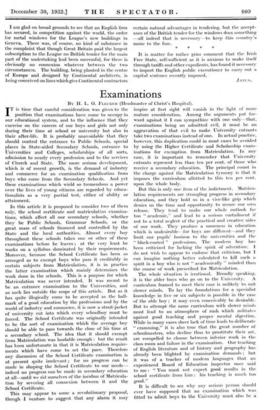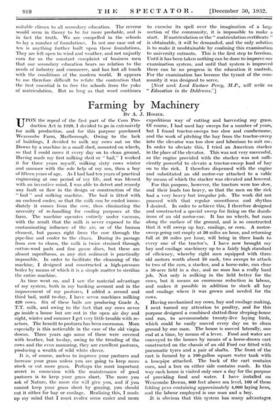Examinations
BY H. L. 0. FLECKER (Hea dmaster of Christ's Hospital).
IT is time that careful consideration was given to the position that examinations have come to occupy in our educational system, and to the influence that they exercise on the careers of our boys and girls not only during their time at school or university but also in their after-life. It is probably unavoidable that they should control the entrance to Public Schools, special places in State-aided Secondary Schools, entrance to Universities and Colleges, scholarships of all sorts, admission to nearly every profession and to the services of Church and State. The more serious development, which is of recent growth, is the demand of industry and commerce for an examination qualification from boys who come from the Secondary Schools. And yet these examinations which wield so tremendous a power over the lives of young citizens are regarded by educa- tionalists as a very partial test, either of ability or attainment.
In this article it is proposed to consider two of them only, the school certificate and matriculation examina- tions, which affect all our secondary schools, whether they be Public Schools, Grammar Schools, or the great mass of schools financed and controlled by the State and the local authorities. Almost every boy throughout these schools takes one or other of these examinations before he leaves ; at the very least he works on a syllabus dominated by their requirements. Moreover, because the School Certificate has been so arranged as to exempt boys who pass it creditably in certain subjects from Matriculation, it is in practice the latter examination which mainly determines the work done in the schools. This is a purpose for which Matriculation was never intended. It was meant to be an entrance examination to the Universities, and as such lies outside the scope of this article. But as it has quite illogically come to be accepted as the hall- mark of a good education by the professions and by the world of industry and commerce, it is now a strait-jacket of university cut into which every schoolboy must be forced. The School Certificate was originally intended to be the sort of examination which the average boy should be able to pass towards the close of his time at a secondary school. The idea that it should exempt from Matriculation was laudable enough : but the result has been unfortunate in that it is Matriculation require- ments which have come to set the pace. Therefore any discussion of the School Certificate examination is at present quite irrelevant ; for no progress can be made in shaping the School Certificate to our needs— indeed no progress can be made in secondary education at all—until we rid ourselves of the incubus of Matricula- tion by severing all connexion between it and the School Certificate.
This may appear to some a revolutionary proposal, though -I venture to suggest that any alarm it may inspire at first sight will vanish in the light of more mature consideration. Among the arguments put for- ward against it I can sympathize with one only—that, examinations being an admitted evil, it must be an aggravation of that evil to make University entrants take two examinations instead of one. In actual practice, however, this. duplication could in most cases be avoided by using the Higher Certificate and Scholarship exam- inations for exemption from Matriculation. In any case, it is important to remember that University entrants represent less than ten per cent. of those who receive a secondary education. The principal count in the charge against the Matriculation tyranny is that it imposes the curriculum allotted to this ten per cent. upon the whole body.
But this is only one item of the indictment. Matricu- lation requirements are strangling progress in secondary education, and they hold us in a vice-like grip which denies us the time and opportunity to secure our own release. They tend to make our whole outlook far too " academic," and lead to a serious curtailment if not to a total neglect of the practical and creative sides of our work. They produce a sameness in education which is undesirable—for boys are different—and they limit our pupils' horizon to the universities and the " black-coated " professions. The modern boy has been criticized for lacking the spirit of adventure. I do not wish to appear to endorse that criticism, but I can imagine nothing better calculated to kill such a spirit in a boy who is not " academically " minded than the course of work prescribed for Matriculation.
The whole situation is irrational. Broadly speaking, it is the abler boys who go on to the University. A curriculum framed to meet their case is unlikely to suit slower minds. To lay the foundations for a specialist knowledge in five or six subjects is possible in the case of the able boy ; it may even conceivably be desirable.
But to attempt the same curriculum with slower minds must lead to an atmosphere of rush which militates against good teaching and proper mental digestion. While in many cases sheer lack of time leads to deliberate " cramming," it is also true that the great number of schoolmasters, who decline thus to prostitute their art, are compelled to choose between inferior work in the class room and failure in the examination. Our teaching of English literature and of history and geography has already been blighted by examination demands ; but it was of a teacher of modern languages that an experienced Board of Education inspector once said to me : " You must not expect good results in the school certificate from him : his teaching is much too good." It is difficult to see why any serious person should ever have supposed that an examination which was fitted to admit boys to the University must also be a suitable climax to all secondary education. The reverse would seem in theory to be far more probable, and is in fact the truth. We are compelled in the schools to lay a number of foundations. In not one case out of ten is anything further built upon those foundations. They are left open to wind and weather, and not unjustly earn for us the constant complaint of business men that our secondary education bears no relation to the needs of industry and commerce, and has lost all touch with the conditions of the modern world. It appears to me therefore difficult to refute the contention that the first essential is to free the schools from the yoke of matriculation. But so long as that word continues to exercise its spell over the imagination of a large section of the community, it is impossible to make a start. If matriculation or the " matriculation certificate " is obtainable, it will be demanded, and the only solution is to make it unobtainable by confining this examination to university entrants. This is the first step to freedom. Until it has been taken nothing can be done to improve our examination system, and until that system is improved there can be no progress in the education it controls, For the examination has become the tyrant of the com- munity it was designed to serve.
[Next week Lord Eustace Percy, M.P., will write on " Education in the Doldrums."]































 Previous page
Previous page